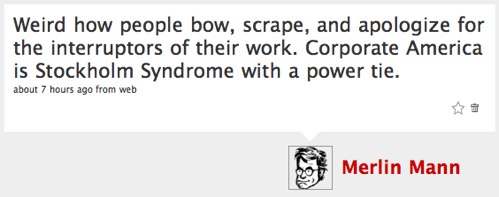Merlin’s weekly podcast with Dan Benjamin. We talk about creativity, independence, and making things you love.
Setting LimitsClosed Doors and Casualties in the "Coup d'attention"Merlin Mann | Aug 16 2008Last night, I got home from a lovely one-day trip to do some speaking, and I was catching up on a couple emails before I went to bed. One of the messages was a thoughtful note from someone who works in the US Government (and whose name, job, and identifying elements I'm changing to protect his or her privacy). "Sally," I'll call her, likes the 43 Folders stuff, but has legitimate concerns about how all this "attention management" stuff might send a wrong or hostile message to her colleagues. It's a great point. read more »POSTED IN:
Time & Attention Presentation: "Who Moved My Brain?"Merlin Mann | Aug 14 2008Who Moved My Brain? Revaluing Time & Attention (slideshare.net)
As I've been going over my slides for the Time & Attention talk, I realized I hadn't shared how the material has evolved since it premiered at Macworld in January. Which is to say, "Kind of a lot." So, I've posted the updated deck. read more »POSTED IN:
Making Time to Make: One Clear LineMerlin Mann | Aug 6 2008
This article is Part 3 of a 3-part series about attention management for people who do creative work called, Making Time to Make.
The point, from my perspective, is that Stephenson possesses the man-sized pant stones to declare precisely what the people who enjoy his work should expect from him. And, in so doing, he has drawn a clear line that some might find hard to love, but that is very easy to see, understand, and respect. No, he didn’t hire someone to answer his email, or get a kid to pretend to be him on Twitter, or install a Greasemonkey script that “autopokes” people on Facebook (I’ll leave you to guess which two of these I do). Neal Stephenson essentially said, “Listen, gang, here’s what I’m going to make for you: novels.” And then, he went back to typing. To working. On work. read more »POSTED IN:
Making Time to Make: The Job You Think You HaveMerlin Mann | Aug 5 2008This article is Part 2 of a 3-part series about attention management for people who do creative work called, Making Time to Make.
POSTED IN:
Making Time to Make: Bad CorrespondenceMerlin Mann | Aug 5 2008This article is Part 1 of a 3-part series about attention management for people who do creative work called, Making Time to Make. Over the years, novelist Neal Stephenson (wiki), has had at least a couple different pages where he's explained why he's chosen to limit the access he provides via email, interviews, and phone calls. It appears to be something he's given a lot of thought to. Via Jessamyn, here's an Archive.org mirror of an older version of his page where he explains his introversion and need to stay focused on his work, alongside FAQs that answer many of the questions he typically has to field. Read it all though. It's pretty good. Stephenson's bottom line?
And here's another well known piece, Stephenson's "Why I am a Bad Correspondent", in which he lays out more details about why he's chosen to create an expectation based on guarding his attention so slavishly: read more »POSTED IN:
Field Reports: Guerrilla Office TacticsMerlin Mann | Oct 1 2007I've started collecting stories -- some of which may be entirely apocryphal tall tales -- of the purported lengths to which people are going to filter noise and to ensure that their time and attention aren't ceded to bad ideas, thoughtless people, or garden-variety time burglars. Here's a few of the more novel ones I've picked up. I'd also love to hear your favorites from amongst the cheats, tricks, and squirrely rules you've heard about: read more »17 Comments
POSTED IN:
Vox Pop: Re-creating scarcityMerlin Mann | Sep 27 2007I have a friend who told me he was thinking about giving his project managers a weekly pile of chips that could be redeemed for person-hours in meetings. So, to schedule firewalled, group face-time, the PM would need to cough up the equivalent number of tokens from her pile. Thus, one, long, all-hands meeting might require the whole week's stack. While, fewer, shorter meetings with smaller groups made the pile go further. It was just an idea, and I'm pretty sure he never implemented it, but I think it's a fascinating concept. Why? Because I love the idea of re-introducing scarcity into systems that lack boundaries. read more »POSTED IN:
|
|
| EXPLORE 43Folders | THE GOOD STUFF |




